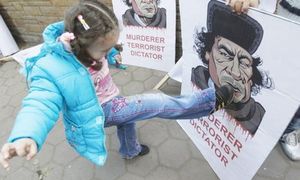 Rebel leaders said they had
consolidated their control of the western city of Misurata on Sunday, taking over the last two government outposts there even as government forces continued to shell the city from its
outskirts.
Rebel leaders said they had
consolidated their control of the western city of Misurata on Sunday, taking over the last two government outposts there even as government forces continued to shell the city from its
outskirts.
Government spokesmen asserted that Libyan forces had withdrawn from the city voluntarily on Saturday to allow for a 48-hour cease-fire, during which tribal leaders could negotiate the rebels’ surrender.
There was no sign of a cease-fire, however, or negotiations.
In Tripoli, the capital, two bombs were seen falling in the vicinity of Colonel Qaddafi’s compound shortly after midnight and the blasts were heard a mile away, part of what Libyan officials complain is an intensifying NATO campaign in recent days. Journalists taken to the Qaddafi compound by government officials found a small complex of office buildings and a meeting space destroyed by the bomb blast, with a tangle of wires and antennae protruding from the smoldering wreckage.
A normally stoic Foreign Ministry official watching the coverage of the blasts in the lobby of the Rixos Al Nasr Tripoli Hotel exclaimed that the bombing had gone too far, and in evident exasperation warned that Libya would be justified in launching terrorist attacks against the cities of NATO members.
The shelling diminished Sunday, but it still killed eight people and wounded 38, according to a rebel spokesman in Misurata, reached by Internet telephone and identified only as Mohammed for his security. On Saturday, as government forces withdrew, he said, 36 people were killed and more than 100 were wounded.
Mohammed said that among those killed Saturday night was his father, Ali. He said his father died along with a cousin who was trying to rescue him when their neighborhood came under heavy shelling.
“The shelling was unprecedented yesterday, both in the intensity and the size of the shells,” he said Sunday, describing the bombardment as using heavy artillery, Grad missiles and Katyusha rockets.
Mohammed said he continued to work as a spokesman after burying his father on Sunday. “It is very tough, but we are in a war and it’s my duty, it’s my way of taking revenge for my father,” he said.
Rebel leaders disputed claims that forces loyal to Col. Muammar el-Qaddafi had withdrawn voluntarily, insisting that they had been defeated in battle.
Misurata, which has been besieged by government forces for the past two months, is the third largest city in Libya and the only major rebel stronghold in the west. Mohammed said the rebels had captured 180 government soldiers in the past week of fighting and were treating them as prisoners of war.
“They even left their wounded behind,” said Jalil el-Gallal, spokesman for the rebels’ de facto governing body, the Transitional National Council. “They were fleeing, not withdrawing.”
Mr. Gallal and Mohammed said rebel forces had taken complete control of the city, and accounts from journalists there generally confirmed that. “There are none and absolutely none of them in the city now,” Mohammed said of Colonel Qaddafi’s troops.
A reporter for the British newspaper The Guardian reported seeing six destroyed tanks in the vegetable market, the scene of particularly heavy fighting last week. The market was where the first American Predator strike in Libya took place on Saturday.
The Guardian also confirmed that the last two buildings held by Qaddafi forces in the city on Saturday had been cleared, and that green Libyan military uniforms had been found that were discarded by retreating troops.
A ship chartered by the International Organization for Migration arrived in Benghazi on Sunday from Misurata, carrying 995 more stranded migrant workers, most of them from Niger, as well as 17 wounded civilians.
The organization said it planned to make at least two more trips into Misurata to rescue 1,500 more migrants, many of whom have been camped near the port in hopes of fleeing. The group said that it expected that other migrants who had been hiding in parts of the city previously controlled by Colonel Qaddafi’s forces might swell that number, now that they could move safely.
In all, the migration group has gotten 4,100 migrant workers from 21 nations out of Misurata.
In Benghazi, the rebel capital, opposition leaders were upbeat about their financial situation. While they have not yet gained access to $30 billion in Libyan money in frozen accounts abroad, as some countries have suggested they should, they have found donors to tide them over.
On Sunday, officials announced that Kuwait had donated about $180 million to the governing council. And Wahid Bugaighis, the interim government’s oil minister, said that while the rebels had not been able to pump any oil from fields in eastern Libya, Qatar had stepped in with an open-ended commitment to finance their fuel and energy needs “with whatever we need during this transition period, with no fees attached.”
Source: http://www.nytimes.com/2011/04/25/world/africa/25libya.html?_r=1&ref=africa

/image%2F0994931%2F20220514%2Fob_0ba45b_picture-interview2.jpg)